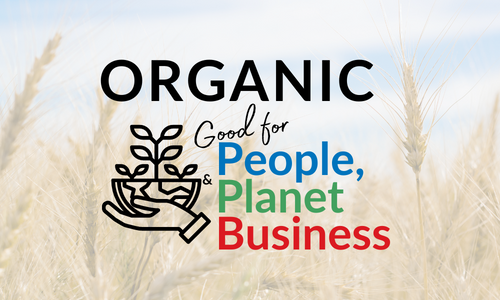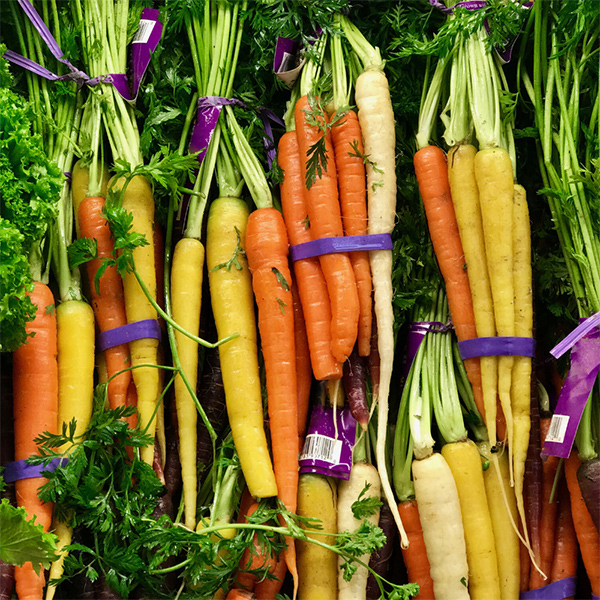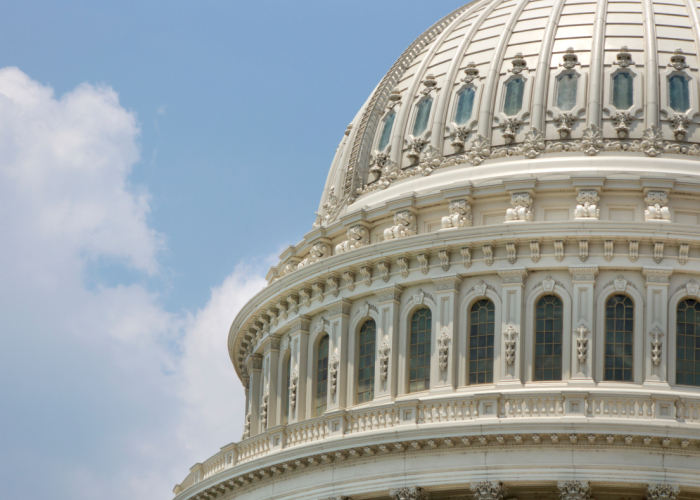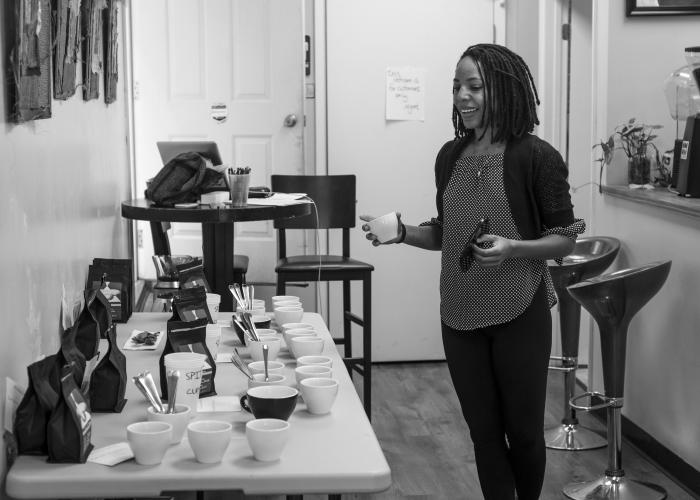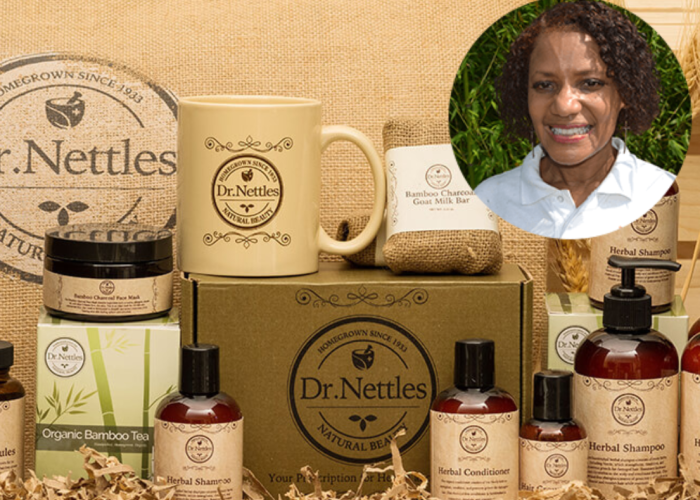We believe that Congress should work with industry to ensure the viability of the public-private partnership and to continue to advance organic standards. A new framework is being set to keep up with the marketplace and maintain the credibility of the USDA organic seal. The Continuous Improvement and Accountability in Organic Standards Act creates a system of accountability and transparency for rulemaking going forward.
The Organic Trade Association spearheaded the largest organic coalition in recent history to support this bill. Now, your voices need to be heard. Contact your representative and urge them to back CIAO. If you or your business is a constituent of a House Agriculture Committee member, contact us to ask how you can help introduce the bill. We’ve put together a comprehensive toolkit to help you take these actions and more. Download it by completing the form below.
Take Action - Download the CIAO Take Action Toolkit by filling out the form below:
The Continuous Improvement and Accountability in Organic (CIAO) Standards Act was introduced to add transparency and accountability to the federal regulatory process for organic and to require USDA to act in a timely and transparent manner when the industry comes together to make recommendations to advance the organic standards.
In the last 20 years, USDA completed rulemaking on only four topics, three of which required an audit from the Office of Inspector General or an act of Congress. Advancing and evolving organic standards is essential to a healthy market and the long-term credibility of the USDA Organic seal. We applaud the actions of this administration to complete two long overdue rules over the two last years, however, organic needs a better more predictable and consistent system for updates to keep the standards modern and relevant. The future depends on fixing this issue to build a healthy organic market backed by a trusted, verified, and enforced claim.
Organic is a voluntary regulatory program for farmers and businesses who choose to meet a strict federal standard and market their products under the USDA organic seal.
The very purpose of the Organic Foods Production Act is to “establish national standards” and “assure consumers that organically produced products meet a consistent standard,” overseen by the USDA National Organic Program. Unfortunately, the federal regulatory apparatus has stifled innovation and continuous improvement within the industry. Consumer trust in organic relies on strong and regularly updated standards that reflect the latest understandings on soil, climate, health, animal welfare, and more.

The current process is not working to expand organic markets or update the standards and every passing year the list of standards requiring updates gets longer. In the last 20 years, USDA has only completed rulemaking on four topics, three of which required an audit from the Office of Inspector General or an act of Congress to get completed. Learn more about each recommendation below.
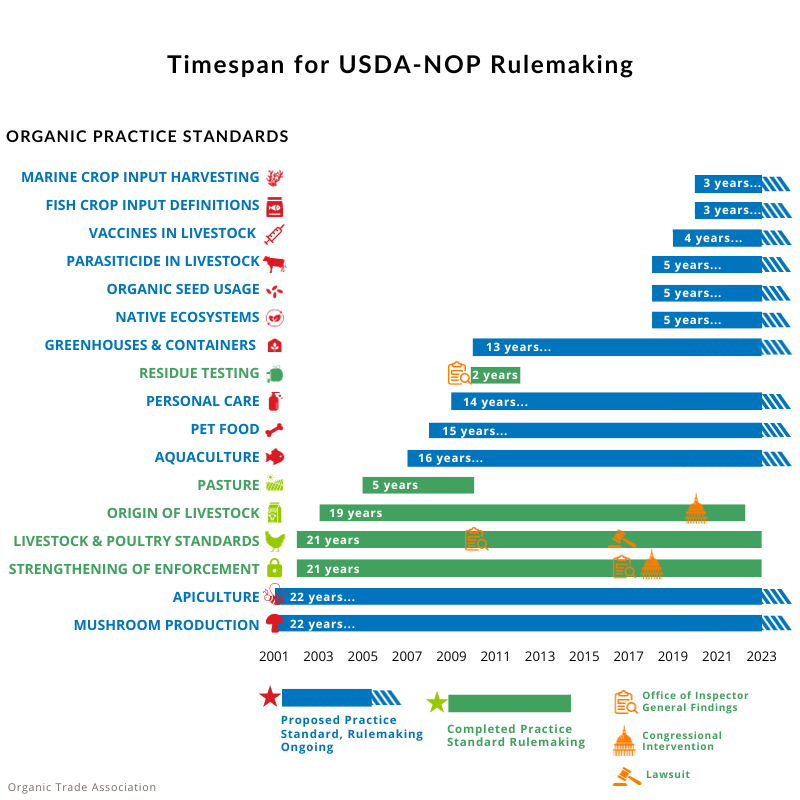
Blue
What is CIAO?
The legislation sets up a transparent and predictable process to ensure relevancy for organic standards. CIAO establishes a five-year timeline for the NOP to engage in the necessary rulemaking before starting the process over – ensuring standards are fresh and in line with current science and consumer demands. Additionally, the process allows for stakeholder input at multiple stages and utilizes the NOSB, the current advisory board to the NOP on organic, permitting stakeholders to have the opportunity to shape any updates or craft new standards in the process. The process starts with a request for information on priorities for the NOP to work on during the five-year cycle. Then the NOP, either utilizing existing recommendations or requesting new ones from the NOSB, moves forward on the update necessary to reflect those priorities and engages in a traditional Administrative Procedures Act process. At the conclusion of the regulatory process and finalization of those updates, the cycle repeats.
Enactment of CIAO will result in an increased success rate for implementing proposed updates to the organic practice standards. How do we know? The organic industry has already seen incredible success updating the list of allowed and prohibited substances through a similar process generally referred to as “sunset review.”
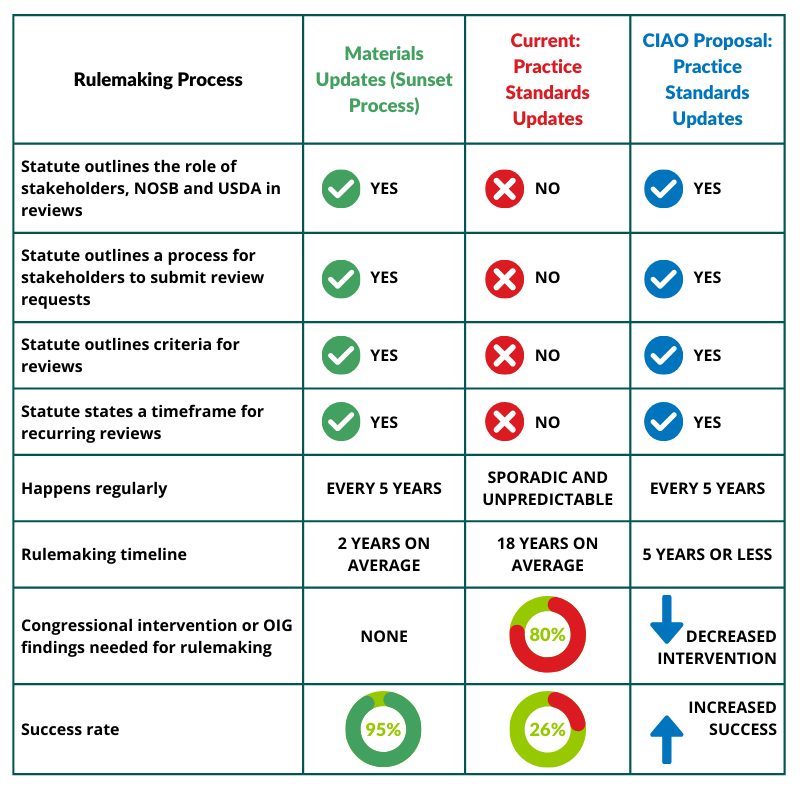
Blue
Coalition Partners
OTA engaged groups of stakeholders, members, and our Farmer Advisory Council through a process to solicit feedback to determine the underlying policy of continuous improvement regarding organic standards. OTA worked with our coalition partners to develop and refine the legislative language and ready the bill for introduction. The coalition continues to refine the language based on feedback from Congress as well as the USDA.
The coalition supporting the legislation reflects the largest organic coalition in recent history spearheaded by OTA, and includes the National Organic Coalition which is made up of more than a dozen farmer organizations, non-profit consumer, environmental and animal welfare organizations, and organic businesses and certifiers; the Specialty Crop Farm Bill Alliance which is a national coalition of more than 200 organizations representing growers of fruits, vegetables, tree nuts, nursery plants and other products; the Organic Famers Association and the Organic Produce Association.
Key Resources:
- Continuous Improvement and Accountability in Organic Standards Act (CIAO) 2023: H.R. 5973
- CIAO Coalition Sign-on Letter
- Press Release: Bipartisan bill introduced to ensure continued advancement of organic
- Farm Bill: Fight for critical advancement of organic
BACKGROUND
Industry, environmental, scientific and public stakeholders collaborate and reach a consensus on developments to organic standards through deliberation at the National Organic Standards Board (NOSB). The NOSB is a federal advisory committee that meets twice a year and provides USDA with recommendations to advance the standards.
JOIN OUR MEMBER TASK FORCE
The Organic Trade Association's Farm Bill Task Force is hard at work building relationships with Members of Congress in both the House and Senate to achieve success on the OTA priorities in the 2023 Farm Bill.
Blue and Green
Apiculture (Rulemaking): In 2010, NOSB recommended to establish specific production standards for organic apiculture (honeybee) production. This recommendation would minimize the wide variation currently used by applying the current livestock production standards to these production systems. Apiculture standards were previously listed on the Unified Agenda and NOP was developing a proposed rule although it was never published. Apiculture was removed from the Unified Agenda in 2018. There has been no formal action on rulemaking for practice standards although some inputs specific for apiculture production have been added to the National List.
References: |
Aquaculture (Rulemaking): Between 2007 and 2009, NOSB passed a series of recommendation to create new standards for organic aquaculture standards. Together the recommendations would authorize organic certification of aquatic plants and animals including finfish and molluscan shellfish, and establish specific standards for feed, health care, facilities, and living conditions for this unique type of livestock. Aquatic animals are currently excluded from the organic regulations; therefore, this series of recommendations would create a new certification scope and market for organic aquaculture products. Aquaculture was previously listed on the Unified Agenda and NOP had completed writing of a proposed rule although it was never published. Aquaculture was removed from the Unified Agenda in 2017.
References: |
Commercial Availability Criteria for Non-organic Agricultural Ingredients (Guidance): In 2007, NOSB passed a recommendation to establish standardized criteria to be used by NOSB, ACA’s, and the organic industry when making commercial availability determinations for agricultural ingredients that are listed on §205.606. NOP accepted the NOSB Recommendation but has not taken action to implement the guidance.
References: |
Excluded Methods Prevention Strategy (Guidance): In 2015, NOSB passed a recommendation to develop guidance that identifies best management practices for organic operations to prevent unintended GE presence in seed and crop production, livestock production, and handling. NOP responded favorable to the recommendation but has not taken action on implementing the guidance.
References: |
Excluded Methods Terminology (Guidance): In 2016, NOSB passed a recommendation that would establish guidance for interpreting the excluded methods provision of the organic regulations. The recommendation includes definitions, principles, criteria that help address the increased diversity in types of genetic manipulations performed on seed, livestock and other inputs used in agriculture. The 2016 recommendation and subsequent recommendations between 2016-2019 identify specific technologies and whether they are prohibited under the existing regulatory definition of excluded methods. NOP has not taken action on implementing guidance.
References: |
Genetic Integrity Transparency of Seed Grown On Organic Land (Instruction): In 2019, NOSB passed a recommendation to establish instructions for certifiers to inform certified producers that information on possible genetic contamination of seeds with GE equivalents could be obtained from their seed suppliers to improve transparency of genetic integrity of seed grown on organic land. NOP's response to the recommendation was neutral (under review) and there has been no action on implementing the instruction.
References: |
Greenhouse Standards (Production Standards for Terrestrial Plants in Containers and Enclosures) (Rulemaking): In 2010, the NOSB passed a recommendation that would allow container and greenhouse production of organic crops under specific provisions that support natural and diverse soil ecology within the container, while prohibiting hydroponic production, with an exception for mushrooms, sprouts, and micro-greens. This recommendation would minimize the wide variation currently used by applying the current crop production standards to these production systems. Hydroponics is defined in the 2010 NOSB Recommendation as “the production of normally terrestrial, vascular plants in nutrient rich solutions or in an inert, porous, solid matrix bathed in nutrient rich solutions.” In 2017, NOSB considered another proposal on hydroponics and container-growing, but the proposal did not pass. However, a motion specific to prohibiting aeroponic production did pass. Hydroponics was the subject of recently litigation, where in the courts concluded that OFPA is ambiguous about hydroponics to the extent that USDA did not abuse its discretion in denying a petition for rulemaking to prohibit hydroponics based only on OFPA. NOP published a memo in 2019 attempting to clarify requirement for land-based container production although many questions still exist from certifiers about the requirements for container and greenhouse production. The Accredited Certifiers Association worked for 6+ months to develop best practices for certifying greenhouse and containers but were unable to come to consensus, and therefore communicated to NOP that inconsistent interpretations among certifiers can only be resolved through rulemaking. Wide variation of policies and significant inconsistencies continue to exist across certifiers, and operations are certifier-shopping.
References: |
Inert Ingredients (Recommendation to Change the EPA List 4 Annotation): EPA List 3 and 4 are no longer in use and the EPA requested that these references be removed from the NOP Regulations in 2010. In 2015, NOSB passed a recommendation that would revise the listing for inert ingredients at §205.601(m) and §205.603(e) to remove the outdated and obsolete references to EPA Lists 3 and 4, and replace with EPA’s current mechanism for approving the least-toxic inert ingredients. In NOP’s response to the 2015 NOSB Recommendation, NOP stated “The NOP has reviewed the NOSB’s recommendation and plans to collaborate further with EPA’s Safer Choice Program to develop a program for inert ingredient review, and to initiate notice and comment rulemaking to revise the annotations for inert ingredients at §205.601(m) and §205.603(e).” For a short time after the 2015 NOSB Recommendation was passed, NOP made some effort to provide verbal updates at NOSB meetings to the organic community on its progress of implementing the recommendation, although this has not occurred since 2016. At the Fall 2020 NOSB Meeting, the Board voted unanimously in favor a resolution calling for NOP action to resolve this regulatory interagency conflict and modernize the system for reviewing inert ingredients. NOP's response to the Fall 2020 resolution indicates it intends to publish an Advanced Notice of Proposed Rulemaking.
References: |
Marine Macroalgae in Crop Fertility Inputs (Rulemaking): In 2020, NOSB recommended a change to the annotation for marine macroalgae used as crop fertility inputs (aquatic plant extracts). The recommendation seeks to provide parameters on harvesting addressing conservation areas, bottom trawling, protecting reproduction of the population and ecosystem functions, biomass and architecture, and bycatch. The recommendation addresses the potential harm to the environment from marine macroalgae used in crop fertility by establishing scientifically sourced harvest parameters created in collaboration with marine science experts in the field. NOP has closed its consideration of this recommendation, noting “Technical complexity of marine environments makes rulemaking on these topics problematic. NOP does not currently plan to move this item forward.”
References:
2020 NOSB Recommendation: Marine Macroalgae in Crop Fertility Inputs
Mushroom Production (Rulemaking): In 2001, NOSB passed a recommendation to establish specific production standards for organic mushroom production. This recommendation would minimize variation among certifies applying the current crop production standards to these production systems. NOP was previously working on developing a proposed rule although it was never published. There has been no formal action on rulemaking for practice standards although some inputs specific for mushroom production have been added to the National List.
References: |
Native Ecosystems (Eliminating the Incentive to Convert in Organic Production) (Rulemaking): In 2018, NOSB recommended a requirement for a ten-year waiting period between conversion of land supporting native ecosystems and subsequent organic certification. NOP's response to the recommendation was neutral (under review) and NOP has not taken action on rulemaking.
References: |
Parasiticides in Livestock (Clarifying “Emergency” Use of Synthetic Parasiticides in Organic Livestock Production) (Rulemaking): In 2018, NOSB passed a recommendation to add definition of “emergency use” to §205.2 (Definitions) and amend §205.238(b) to providing clear protocols that need to be in place before the use of approved synthetic parasiticides are used on organic livestock. The goal of the recommendation is to promote consistent implementation when certifiers allow the use of the National List approved synthetic parasiticides, as well as providing clear direction to certified organic operators so they can plan their animal health strategies which first promote animal health through a wide variety of practices. Following the NOSB Recommendation, NOP Responded that it was reviewing the recommendation. NOP has not proceeded with rulemaking action on this recommendation, but NOP has implemented other National List revisions relevant to parasiticides.
References: |
Personal Care (Rulemaking): In 2009, NOSB passed a recommendation to recognize personal care products (cosmetics, body care) under the scope of National Organic Program enforcement. This recommendation will ensure that USDA can police organic claims on personal care products and require compliance with organic standards. NOP published a Policy Memo (22-1) and a Fact Sheet in 2008 although has not taken any action on rulemaking.
References: |
Pet Food (Rulemaking): In 2008, NOSB passed a recommendation to recognize pet food under the scope of National Organic Program enforcement. This recommendation will ensure that USDA can police organic claims on pet food and require compliance with organic standards specific to organic pet food composition, handling, and labeling. Pet food standards would create a market for organic livestock operations’ slaughter byproducts and other types of meat feed ingredients under consistent and appropriate standards. Pet food standards were previously listed on the Unified Agenda and NOP was developing a proposed rule although it was never published. Pet food was removed from the Unified Agenda in 2018.
References: |
Strengthening Organic Seed Usage (Rulemaking): In 2018, NOSB passed a recommendation to implement a rule change that would require certified crop producers to demonstrate improvement in sourcing and use of organic seed/planting stock every year. NOP accepted the recommendation but has not taken action on rulemaking.
References: |
Strengthening Organic Seed Usage (Guidance): In 2019, NOSB passed a recommendation for a series of improvements to the existing NOP Guidance 5029 Seeds, Annual Seedlings, and Planting Stock in Organic Crop Production that includes both incentives and practical language to aid producers and certifiers in overseeing and encouraging the use of organic seed. NOP accepted the recommendation but has not taken action on rulemaking.
References: |
Vaccines in Livestock (Use of Excluded Methods Vaccines in Livestock Production) (Rulemaking): In 2019, NOSB recommended to limit the use of livestock vaccines made from excluded methods only when an equivalent alternative not made from excluded methods is not commercially available to prevent a specific disease. There has not been any NOP action since its response to the NOSB Recommendation that “AMS is reviewing the NOSB’s recommendation."
References: |
Wild, Native Fish for Fertilizer Production (Rulemaking): In 2020, NOSB recommended a change to the annotation for liquid fish products used for fertility in organic crop production to limit sources to only those from fish waste, bycatch, or invasive species. With the acknowledgment most fish fertilizers used by U.S. farmers comes from fish waste and byproducts, the Board noted the importance and need for further clarifying wild native fish for use in fertility products is not essential for organic farming as alternative products exist. NOP has closed its consideration of this recommendation, noting “Technical complexity of marine environments makes rulemaking on these topics problematic. NOP does not currently plan to move this item forward.”
References:
2020 NOSB Recommendation: Wild, Native Fish for Fertilizer Production

